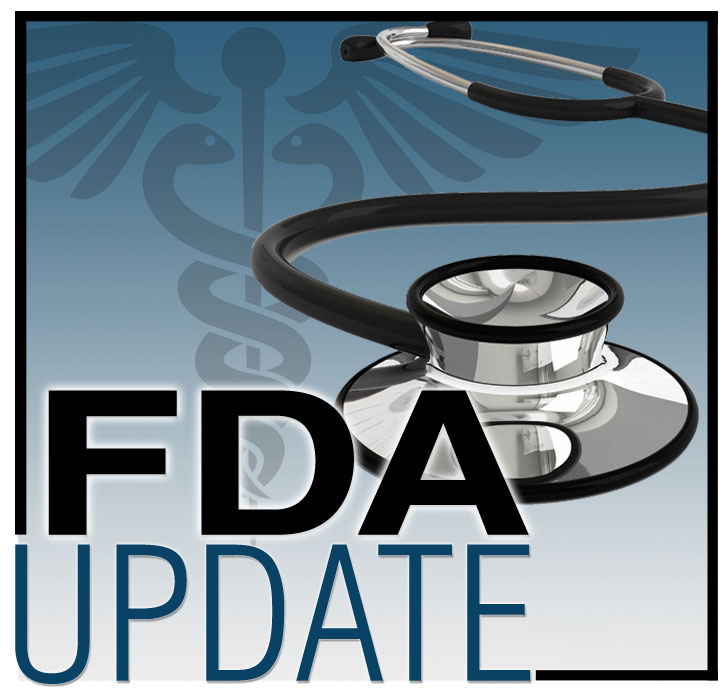FDA Approves Niraparib for Recurrent Ovarian, Fallopian Tube, or Primary Peritoneal Cancer

On March 27, 2017, the U.S. Food and Drug Administration (FDA) approved niraparib, a poly ADP-ribose polymerase (PARP) inhibitor, for the maintenance treatment of adult patients with recurrent epithelial ovarian, fallopian tube, or primary peritoneal cancer who are in complete or partial response to platinum-based chemotherapy.
Approval was based on a randomized trial (NOVA) of 553 patients with recurrent epithelial ovarian, fallopian tube, or primary peritoneal cancer who had received at least two prior treatments of platinum-based chemotherapy and were in a complete or partial response to the most recent chemotherapy treatment. Patients were randomized (2:1) within 8 weeks of the last therapy to either niraparib (300 mg orally daily) or matched placebo. Patients were assigned to one of two cohorts based on the BRACAnalysis CDx. Patients with deleterious or suspected deleterious germline BRCA mutations (gBRCAm) were assigned to the germline BRCA-mutated (gBRCAmut) cohort (n=203), and those without germline BRCA mutations were assigned to the non-gBRCAmut cohort (n=350).
The trial demonstrated a statistically significant improvement in progression-free survival (PFS) for patients randomized to niraparib compared with placebo in both cohorts. The estimated median PFS for those taking niraparib who had a germline BRCA mutation was 21 months compared with 5.5 months for those in the gBRCAmut cohort receiving placebo (HR=0.26; 95% CI: 0.17, 0.41; p<0.0001). The estimated median PFS for those taking niraparib who did not have a germline BRCA mutation was 9.3 months compared with 3.9 months for those patients in the non-gBRCAmut cohort receiving placebo (HR=0.45; 95% CI: 0.34, 0.61; p<0.0001).
The FDA approved niraparib with the complementary diagnostic BRACAnalysis CDx that detects the presence of gBRCAm in blood samples from ovarian cancer patients. BRACAnalysis CDx was originally approved in 2014 as a companion diagnostic test for use with Lynparza (olaparib). The FDA’s approval of the expanded indications for the use of BRACAnalysis CDx with niraparib was based on data from the NOVA trial.
Niraparib’s safety was evaluated in 367 patients with platinum-sensitive recurrent ovarian, fallopian tube, and primary peritoneal cancer in the NOVA trial. The most common adverse reactions occurring in at least 10% of patients receiving niraparib were thrombocytopenia, anemia, neutropenia, leukopenia, palpitations, nausea, constipation, vomiting, abdominal pain/distention, mucositis/stomatitis, diarrhea, dyspepsia, dry mouth, fatigue, decreased appetite, urinary tract infection, AST/ALT elevation, myalgia, back pain, arthralgia, headache, dizziness, dysgeusia, insomnia, anxiety, nasopharyngitis, dyspnea, cough, rash, and hypertension. Myelodysplastic syndrome and/or acute myeloid leukemia occurred in 5 of 367 (1.4%) patients receiving niraparib and in 2 of 179 (1.1%) patients assigned to placebo. Grade 3-4 hypertension occurred in 9% of niraparib- treated patients compared with 2% of patients assigned to placebo.
The recommended dose and schedule of niraparib is 300 mg taken once daily with or without food.
The FDA granted this application Fast Track, Priority Review, and Breakthrough Therapy designation, as well as Orphan Drug designation specifically for treating recurrent epithelial ovarian cancer. FDA approved this application approximately three months ahead of the goal date. A description of FDA expedited programs is in the Guidance for Industry: Expedited Programs for Serious Conditions-Drugs and Biologics (http://www.fda.gov/downloads/drugs/guidancecomplianceregulatoryinformation/guidances/ucm358301.pdf).
Healthcare professionals should report all serious adverse events suspected to be associated with the use of any medicine and device to FDA’s MedWatch Reporting System by completing a form online (http://www.fda.gov/medwatch/report.htm), by faxing (1-800-FDA-0178) or mailing the postage-paid address form provided online, or by telephone (1-800-FDA-1088).
In collaboration with the FDA and as a service to our members, ONS provides updates on recent FDA approvals and other important FDA actions (e.g., updated safety information, new prescribing information) pertaining to therapies for patients with cancer. This allows the agency to inform oncologists and professionals in oncology-related fields in a timely manner. Included in the FDA updates is a link to the product label or to other sites for additional relevant clinical information. In supplying this information, ONS does not endorse any product or therapy and does not take any position on the safety or efficacy of the product or therapy described.
